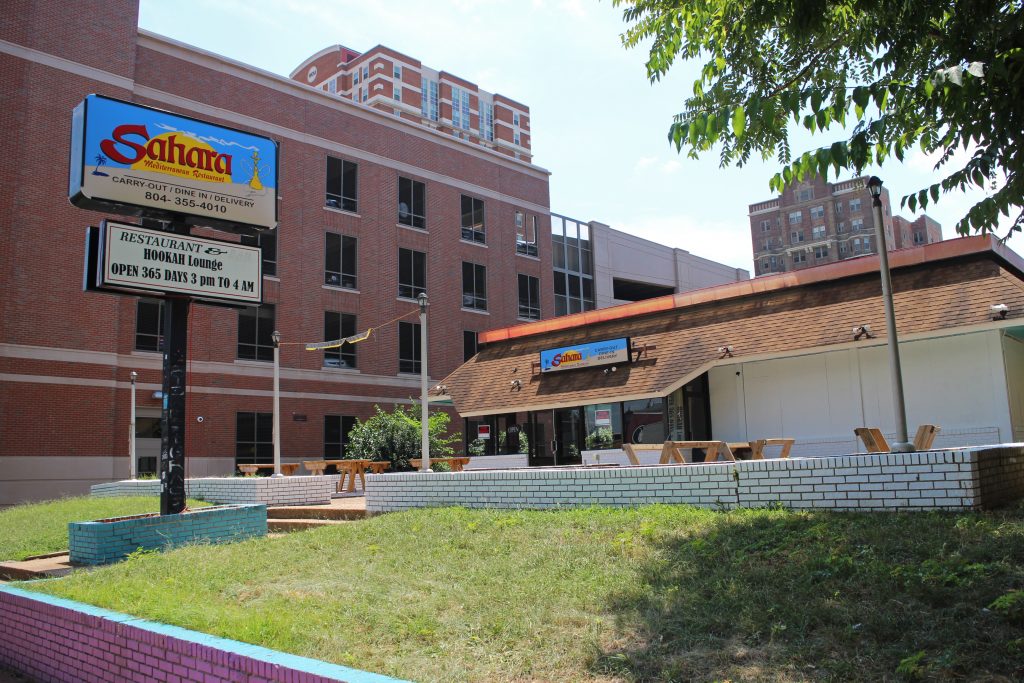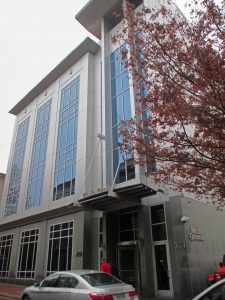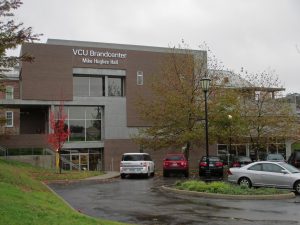VCU is looking to a large bond offering as a way to snatch up more real estate, including a shuttered Grace Street restaurant property it has eyed for a number of years and a vacant downtown office building.
A hearing is scheduled Nov. 30 for the school’s proposal to issue up to $15 million in general revenue pledge bonds. It intends to use the money to purchase the Sahara restaurant property at 813 W. Grace St. and a Media General-owned 31,000-square-foot office building at 111 N. Fourth St.
The proceeds would also be used to refinance existing debt, as well as pay for renovations and improvements to five properties the university already owns.
In addition to buying the Sahara property, the bonds would fund the demolition of the existing building, the hearing notice states. The building hit the market this summer and is sandwiched between newer VCU parking decks, dormitories and academic buildings built in recent years. It does not specify a planned use for the property.
Media General still owns the North Fourth Street building, which would be acquired, renovated and equipped using the bonds. The company purchased the 0.18-acre property in 1977 for $500,000. It was most recently assessed at $4.9 million.
The five existing VCU properties in question, all owned by the VCU Real Estate Foundation (VCUREF), are the Technology Administration Building at 701 W. Broad St.; administrative and academic facilities at 14 N. Laurel St. and 811-817 S. Cathedral Place; the VCU Brandcenter at 103 S. Jefferson St.; and the former Commonwealth Cancer Institute building at 1109 W. Marshall St.
VCU Treasurer Tim Graf said the issuance would be the latest bond financing for the university, which he said does such financing fairly regularly. He said the bonds are an opportunity to take advantage of attractive interest rates and improve the debt financing on the five properties.
“A number of those on that list are already financed, but they’re not on a long-term financing basis,” he said. “This is a long-term bond that will lock in low interest rates for VCU on all these properties.”
The Sahara and Media General properties will be owned by VCUREF, a nonprofit arm that handles many real estate matters for the school.
“Everything that’s on this list, the intent is that the university or university-related entities will own them or already do, and that they will be leased to the university on a long-term basis,” Graf said.
Calls to VCU Real Estate Services and VCUREF were not returned.
The bonds would be used to re-fund all or a portion of bonds previously issued for the acquisition, construction and equipping of the Technology Administration Building. The 30,000-square-foot building on 0.19 acres is just west of the site of the under-construction Institute for Contemporary Art.
And the bonds would refinance existing debt and pay for renovations of 14 N. Laurel St., an 8,400-square-foot building that currently houses the university’s school of world studies and religious studies program. VCUREF purchased the 0.12-acre property in 2007 for $4.04 million, according to city records.
The same would go for the row of four buildings that make up 811-817 S. Cathedral Place, which house the Wellness Resource Center and offices for the history department, the division for inclusive excellence and the office of research and innovation. VCUREF purchased the nearly half-acre property totaling 4,312 square feet in multiple sales in 2008 that totaled $1.7 million.
The Brandcenter building would be renovated and equipped. VCUREF purchased the property – a 17,000-square-foot building on one-third of an acre – in 2003 for $1.15 million.
The bonds would also pay for renovations to the former Commonwealth Cancer Institute building, located across North Harrison Street from the Siegel Center and currently being used by VCU Athletics for student-athlete support services. VCUREF purchased the half-acre property and 6,600-square-foot building in 2013 for $925,000.
The Sahara restaurant property is currently owned by Konstantinos and Ekaterini Hatzigiannidis, who purchased the quarter-acre property and 3,800-square-foot building in 1998 for $350,000. The latest assessment by the city of Richmond valued the property at $836,000. The restaurant sued the university in 2012 because two neighboring VCU construction projects were allegedly disrupting its business. VCU fought back and the case was eventually dismissed.
The acquisitions of the Sahara and Media General buildings would be the latest for the university, which has purchased multiple properties in and around its Monroe Campus in recent years. Recent purchases have included an apartment building at 616 W. Grace St. and a former gas station property at the southeast corner of West Broad and North Belvidere streets.
VCU is looking to a large bond offering as a way to snatch up more real estate, including a shuttered Grace Street restaurant property it has eyed for a number of years and a vacant downtown office building.
A hearing is scheduled Nov. 30 for the school’s proposal to issue up to $15 million in general revenue pledge bonds. It intends to use the money to purchase the Sahara restaurant property at 813 W. Grace St. and a Media General-owned 31,000-square-foot office building at 111 N. Fourth St.
The proceeds would also be used to refinance existing debt, as well as pay for renovations and improvements to five properties the university already owns.
In addition to buying the Sahara property, the bonds would fund the demolition of the existing building, the hearing notice states. The building hit the market this summer and is sandwiched between newer VCU parking decks, dormitories and academic buildings built in recent years. It does not specify a planned use for the property.
Media General still owns the North Fourth Street building, which would be acquired, renovated and equipped using the bonds. The company purchased the 0.18-acre property in 1977 for $500,000. It was most recently assessed at $4.9 million.
The five existing VCU properties in question, all owned by the VCU Real Estate Foundation (VCUREF), are the Technology Administration Building at 701 W. Broad St.; administrative and academic facilities at 14 N. Laurel St. and 811-817 S. Cathedral Place; the VCU Brandcenter at 103 S. Jefferson St.; and the former Commonwealth Cancer Institute building at 1109 W. Marshall St.
VCU Treasurer Tim Graf said the issuance would be the latest bond financing for the university, which he said does such financing fairly regularly. He said the bonds are an opportunity to take advantage of attractive interest rates and improve the debt financing on the five properties.
“A number of those on that list are already financed, but they’re not on a long-term financing basis,” he said. “This is a long-term bond that will lock in low interest rates for VCU on all these properties.”
The Sahara and Media General properties will be owned by VCUREF, a nonprofit arm that handles many real estate matters for the school.
“Everything that’s on this list, the intent is that the university or university-related entities will own them or already do, and that they will be leased to the university on a long-term basis,” Graf said.
Calls to VCU Real Estate Services and VCUREF were not returned.
The bonds would be used to re-fund all or a portion of bonds previously issued for the acquisition, construction and equipping of the Technology Administration Building. The 30,000-square-foot building on 0.19 acres is just west of the site of the under-construction Institute for Contemporary Art.
And the bonds would refinance existing debt and pay for renovations of 14 N. Laurel St., an 8,400-square-foot building that currently houses the university’s school of world studies and religious studies program. VCUREF purchased the 0.12-acre property in 2007 for $4.04 million, according to city records.
The same would go for the row of four buildings that make up 811-817 S. Cathedral Place, which house the Wellness Resource Center and offices for the history department, the division for inclusive excellence and the office of research and innovation. VCUREF purchased the nearly half-acre property totaling 4,312 square feet in multiple sales in 2008 that totaled $1.7 million.
The Brandcenter building would be renovated and equipped. VCUREF purchased the property – a 17,000-square-foot building on one-third of an acre – in 2003 for $1.15 million.
The bonds would also pay for renovations to the former Commonwealth Cancer Institute building, located across North Harrison Street from the Siegel Center and currently being used by VCU Athletics for student-athlete support services. VCUREF purchased the half-acre property and 6,600-square-foot building in 2013 for $925,000.
The Sahara restaurant property is currently owned by Konstantinos and Ekaterini Hatzigiannidis, who purchased the quarter-acre property and 3,800-square-foot building in 1998 for $350,000. The latest assessment by the city of Richmond valued the property at $836,000. The restaurant sued the university in 2012 because two neighboring VCU construction projects were allegedly disrupting its business. VCU fought back and the case was eventually dismissed.
The acquisitions of the Sahara and Media General buildings would be the latest for the university, which has purchased multiple properties in and around its Monroe Campus in recent years. Recent purchases have included an apartment building at 616 W. Grace St. and a former gas station property at the southeast corner of West Broad and North Belvidere streets.






Is the Fourth Street property outside of VCU’s Master Plan boundary?
If so, its purchase violates the Management Agreement between VCU and the Commonwealth of Virginia that states that capital projects must be “consistent with the University’s published Master Plan.” “Exhibit A … V. CAPITAL PROGRAM.
The President, acting through the Senior Vice President for Finance and Administration or other
designee, shall adopt a system for developing one or more capital project programs that defines or define the capital needs of the University for a given period of time consistent with the University’s published Master Plan.”
http://www.oregonhill.net/2014/12/13/vcu-continues-to-disregard-its-own-master-plan-counter-to-state-agreement/